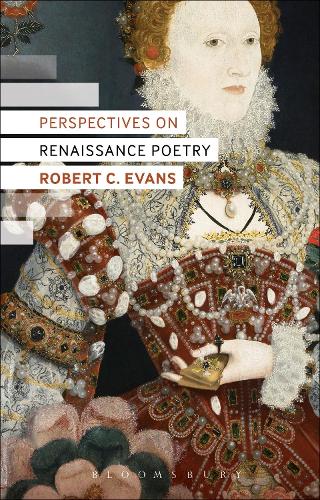
Perspectives on Renaissance Poetry
(Paperback)
Available Formats
Publishing Details
Perspectives on Renaissance Poetry
By (Author) Dr Robert C. Evans
Bloomsbury Publishing PLC
Bloomsbury Academic
22nd October 2015
United Kingdom
Classifications
Tertiary Education
Non Fiction
Literary studies: poetry and poets
821.309
Physical Properties
Paperback
240
Width 138mm, Height 214mm, Spine 18mm
300g
Description
Introducing students to the full range of approaches to the study of Renaissance poetry that they are likely to encounter in their course of study, Perspectives on Renaissance Poetry is an authoritative and accessible guide to the verse of the Early Modern period. Each chapter covers a major figure in Early Modern poetry and explores two different poems from a full range of theoretical perspectives, including: - Classical - Formalist - Psychoanalytic - Marxist - Structuralist - Reader-response - New Historicist - Ecocritical - Multicultural Poets covered include: Thomas Wyatt, Henry Howard, Earl of Surrey, Anne Vaughan Lock, Sir Philip Sidney, Edmund Spenser, Christopher Marlowe, William Shakespeare, John Donne, Ben Jonson, Aemilia Lanyer, Martha Moulsworth, Lady Mary Wroth, George Herbert, Robert Herrick, Andrew Marvell, John Milton and Katherine Philips.
Reviews
This primer in applied critical theory bridges the gap between early modern English poetry and various analytical approaches to literature. It is more focused than other introductory guides to criticism, such as Wilfred Guerins Handbook of Critical Approaches to Literature (1966; 2nd., 1979) and Charles Bresslers Literary Criticism: An Introduction to Theory and Practice. Evans (English and philosophy, Auburn Univ., Montgomery) offers paragraph-length summaries of 20 critical methodologies and demonstrates, in chapter-length discussions, how they elucidate some 30 Renaissance poems by writers from Wyatt to Milton (included are several poems by Emilia Lanier, Anne Vaughn Lock, and Lady Mary Wroth). Evanss style is direct and accessible but never simplistic. Not every method is applied to every text (one misses a psychoanalytic reading of Donnes Flea and Holy Sonnet 14), but Evans succeeds in showing how early modern texts might respond to a variety of reading approaches. Specialists may find the books design somewhat schematic, but the intended audience (less experienced readers) will welcome Evans's concise yet careful distinctions among a variety of potentially challenging, theoretical strategies. Supplementary materials by Anne Kemp and Christina Garner offer useful additional examples of explication and a taxonomy of critical methods. Summing Up: Highly recommended. Lower- and upper-division undergraduates; graduate students; general readers. -- C. Baker, Armstrong State University, USA * CHOICE *
Perspectives on Renaissance Poetry aims to demystify literary theory for undergraduates and largely succeeds at doing so Evans explains complex concepts in admirably clear and simple language, making this an excellent text for a theory course aimed at advanced undergraduates. His focus is on teaching students to recognize the questions, concerns, and habits of thought underlying each critical approach, rather than the jargon. The appendix, with its detailed lists of questions that different critics might ask of a text, is particularly helpful at guiding students to apply these ideas This book effectively illustrates, in clear and simple language, how and why readers can arrive at such different interpretations of the same text, even within a single critical framework Students should come away from Evanss book with an enhanced sense of how and why familiarity with theory can make their readings of primary texts richer. * Sixteenth Century Journal *
A useful reference work Texts of poems are followed by discussion using different critical approaches, offering paragraph-length accounts of twenty critical methodologies and showing, through application of one or several of them to individual poems, the ways in which they enrich thirty Renaissance poems. Mainly aimed at undergraduates, there is much to be gained from Evanss sensible discussions. * The Years Work in English Studies *
Author Bio
Robert C. Evans is Professor of English at Auburn University Montgomery, USA. He is the author or editor of approximately twenty books (more than half on the 17th century) and has won a number of teaching awards.
